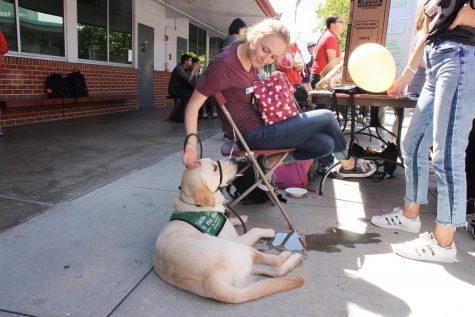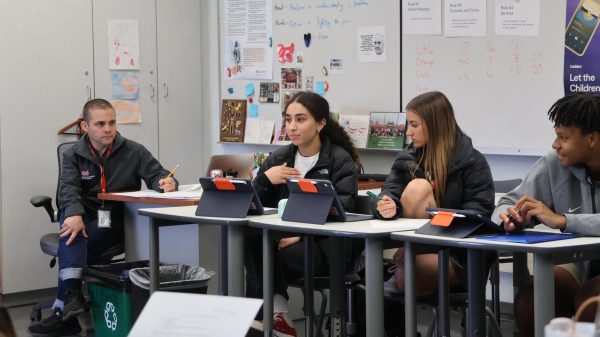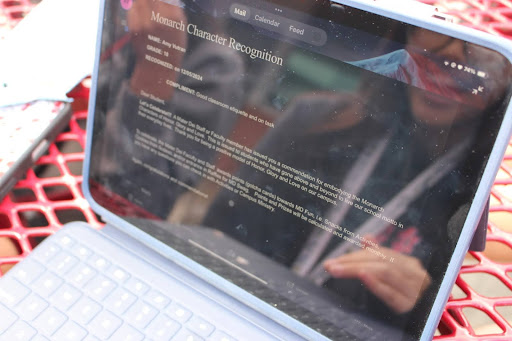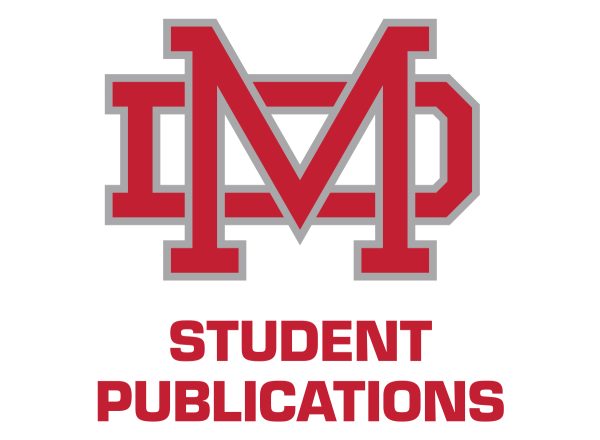New Guide Dogs for the Blind club serves more than just the MD community

HARD AT WORK: Corky and senior Melita Kalczynska promotes her new club, Guide Dogs for the Blind, at the annual Club Fair on Sept. 12. “It’s an amazing feeling being able to train a puppy into a dog that can be that support system for someone who is blind,” senior and club member Kiki Kitsinis said.
If you attended this year’s club fair, you might have been one of the many who took a double take at the sight of Corky, the Lab/Golden mix sitting by the Guide Dogs for the Blind (GDB) booth. The GDB club was started this year by sisters senior Melita Kalczynska and sophomore Olivia Kalczynska. With help from social studies teacher and club moderator Brittany Machian, the club serves people beyond the school community by informing students about how they can get involved in training a guide dog for the blind.
Melita serves as the club’s president and GDB host to Corky, who is in the process of being trained as a guide dog.
“Starting this club is rewarding because it gives me the opportunity to make a difference in the community now,” Melita said. “A lot of what I do in my academics is geared toward the impact I can potentially make in the future. By starting GDB Club, I can make a difference now in my high school community.”
Through the club, Melita hopes to spread awareness for the organization and get some of her peers informed on how to do host a dog.
“The Guide Dogs for the Blind Club adds values to the Mater Dei community by showing the students who choose to sign up how interesting it is to be able to raise a guide dog, who later on will be a support system for someone who isn’t able to see,” senior and club member Kiki Kitsinis said.
The organization The Guide Dogs For The Blind is a nonprofit founded in 1942 by Lois Merrihew and Don Donaldson. After going through an interview process and being accepted by the organization, the individual applying will adopt a Labrador Retriever, Golden Retriever, or a Lab/Golden cross. The individual will then raise the dog and train them with basic commands until the dog is about 1 and a half years old. Eventually, the dog will graduate, leave the training home, and continue a more intensive training specifically for the blind on the GDB campus in San Rafael, Calif.

DRIVERS FATIGUE: During a drive back from the beach, senior Melita Kalczynska’s dog that she is hosting as part of the Guide Dogs for the Blind program takes a nap after a long day of running on the sand. “As a raiser, it can be tough to see the dogs leave but we always keep in mind that the dog is going to help change a blind person’s life,” Kalczynska said.
“Many people see service dogs in the community but may not understand the intensive training they go through and how many important services they can provide to their owners. It’s also helpful for the club to teach people how to interact with service dogs they may encounter while out and about and also give anyone interested further information on how they can help raise a puppy to be a guide dog for the blind,” Machian said. “We are planning on having individuals with visual handicaps who use service dogs come in to speak to Mater Dei students, and I think that making these personal connections is vital to understanding the importance of the club.”
The club already has more than 50 students signed up with new members signing up everyday. If you are interested in joining, visit Machian’s classroom in room 510 or email [email protected] with any questions.
Your donation will support the Student Publications Department at Mater Dei High School. Your contribution will allow us to keep our equipment up to date and cover our annual website hosting costs.








![CELEBRATION IN FAITH AND UNITY Chaplain Father Mark Cruz gives his homily on bringing together a community of people blessed with Catholic education. Catholic Schools Week (CSW) is for celebrating how Catholic education has changed our lives. “I believe Mass plays a huge role in CSW because it reminds us how crucial faith is to our everyday lives,” Delaney said. “During CSW not only should we thank our faculty and staff, but also [remember] that CSW is centered around our connection to God.”](https://thescarletscroll.com/wp-content/uploads/2025/02/Father-Mark.jpg)


![DUNK THE TRASHKETBALL Honors Biology Teacher Kelly Petro clarifies the rules of his interactive science activity. Trashketball, Petro’s newly created game, reinstates crucial science concepts and terminology while allowing students to study recently learned material. Whether in the classroom or on the lacrosse field, Petro ensures that his student-athletes absorb the information using unique study methods. “For school, I try [to have] a general sense of what works for everyone in the classroom [studying wise]. I want everyone to know the [importance of what we are doing in biology],” Petro said.](https://thescarletscroll.com/wp-content/uploads/2025/06/HEIF-Image-600x400.jpeg)

Michael Manchester • Oct 19, 2018 at 8:54 pm
Wonderful exposure for GDB and for BAARK! Thank you, Melita and Olivia!❤️
Olivia Kalczynski • Oct 19, 2018 at 8:47 pm
This is a great article Ellie! Thank you for writing about the club! 🙂
Emily • Oct 19, 2018 at 4:38 pm
Great story Ellie! I really enjoyed learning about this new club at MD!
Lauren Calvillo • Oct 19, 2018 at 4:23 pm
This article was great! It was so informing! :))
Madison Condon • Oct 19, 2018 at 4:18 pm
This was amazing! It was really cool to learn about the club because I wouldn’t of known what it did if I hadn’t read this 🙂